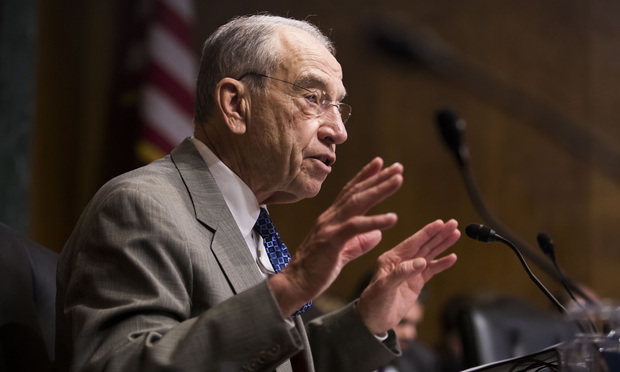Republican Senators Reintroduce Bill Pushing for Disclosure of Litigation Funding
Sens. Chuck Grassley of Iowa, John Cornyn of Texas, Thom Tillis of North Carolina, and Ben Sasse reintroduced the Litigation Funding Transparency Act (LFTA) on Wednesday.
February 13, 2019 at 06:40 PM
3 minute read
 U.S. Sen. Charles Grassley, R-Iowa, during a Senate Judiciary Committee confirmation hearing, Nov. 15, 2017. Photo: Diego M. Radzinschi/NLJ
U.S. Sen. Charles Grassley, R-Iowa, during a Senate Judiciary Committee confirmation hearing, Nov. 15, 2017. Photo: Diego M. Radzinschi/NLJ
A group of Republican U.S. senators have reintroduced legislation that would require plaintiffs to disclose when they've secured third-party funding in litigation.
Sens. Chuck Grassley of Iowa, John Cornyn of Texas, Thom Tillis of North Carolina, and Ben Sasse of Nebraska reintroduced the Litigation Funding Transparency Act (LFTA) on Wednesday. The bill would require disclosure of third-party litigation funding for class actions and multidistrict litigation within 10 days of a case being filed, or 10 days after the closure of a funding deal. The bill, likewise, would require disclosure of financing to provide cash for plaintiffs.
Grassley, Cornyn and Tillis proposed a prior version of the bill last year after a less extensive bill that called only for disclosure only in class actions passed out of the U.S. House of Representatives in 2017—before Democrats took a majority of House seats in the November 2018 elections.
Lisa A. Rickard, the president of the U.S. Chamber Institute for Legal Reform, said in a statement supporting the bill that “Congress also sees the dangers that secretive lawsuit funding deals pose to fairness and justice in our courts.”
“It's time for the lucrative business of betting on other peoples' lawsuits to get examined in the light of day, and the Litigation Funding Transparency Act will do just that,” she said.
Liz Bigham, the chief marketing officer of funder Burford Capital said in an email that the only thing that has changed since an identical version of the bill was introduced last year “is an increase in lobbying efforts by narrow and well-funded special interests.”
“Forced disclosure would add a layer of unnecessary regulation, delay and expense to an already overburdened legal system, hurting American businesses both large and small, and would quickly become weaponized as an end-run around legal privileges and other confidentiality rules to harass private parties,” she said.
The reintroduction of the bill comes as a group of 30 current and former in-house counsel at major companies have backed a proposal to amend Federal Rules of Civil Procedure to require full disclosure of third-party funding in litigation.
“We believe the reasons for requiring full disclosure are strong and well documented in the record before the Advisory Committee,” wrote the group, which included top lawyers at Google, GlaxoSmithKline plc, Verizon Wireless, AT&T Inc. and others. “When litigation funders invest in a lawsuit, they buy a piece of the case; they effectively become real parties in interest. Defendants (and courts) have a right to know who has a stake in a lawsuit and to assess whether they are using illegal or unethical means to bring the action.”
Read more:
What Are People Saying About the Senate's New Lit Funding Bill?
Perspectives From a Litigation Funder: The Case for Sensible Disclosure
This content has been archived. It is available through our partners, LexisNexis® and Bloomberg Law.
To view this content, please continue to their sites.
Not a Lexis Subscriber?
Subscribe Now
Not a Bloomberg Law Subscriber?
Subscribe Now
NOT FOR REPRINT
© 2025 ALM Global, LLC, All Rights Reserved. Request academic re-use from www.copyright.com. All other uses, submit a request to [email protected]. For more information visit Asset & Logo Licensing.
You Might Like
View All
Skadden and Steptoe, Defending Amex GBT, Blasts Biden DOJ's Antitrust Lawsuit Over Merger Proposal
4 minute read
'Lack of Independence' or 'Tethered to the Law'? Witnesses Speak on Bondi
4 minute read
Trending Stories
- 1How ‘Bilateral Tapping’ Can Help with Stress and Anxiety
- 2How Law Firms Can Make Business Services a Performance Champion
- 3'Digital Mindset': Hogan Lovells' New Global Managing Partner for Digitalization
- 4Silk Road Founder Ross Ulbricht Has New York Sentence Pardoned by Trump
- 5Settlement Allows Spouses of U.S. Citizens to Reopen Removal Proceedings
Who Got The Work
J. Brugh Lower of Gibbons has entered an appearance for industrial equipment supplier Devco Corporation in a pending trademark infringement lawsuit. The suit, accusing the defendant of selling knock-off Graco products, was filed Dec. 18 in New Jersey District Court by Rivkin Radler on behalf of Graco Inc. and Graco Minnesota. The case, assigned to U.S. District Judge Zahid N. Quraishi, is 3:24-cv-11294, Graco Inc. et al v. Devco Corporation.
Who Got The Work
Rebecca Maller-Stein and Kent A. Yalowitz of Arnold & Porter Kaye Scholer have entered their appearances for Hanaco Venture Capital and its executives, Lior Prosor and David Frankel, in a pending securities lawsuit. The action, filed on Dec. 24 in New York Southern District Court by Zell, Aron & Co. on behalf of Goldeneye Advisors, accuses the defendants of negligently and fraudulently managing the plaintiff's $1 million investment. The case, assigned to U.S. District Judge Vernon S. Broderick, is 1:24-cv-09918, Goldeneye Advisors, LLC v. Hanaco Venture Capital, Ltd. et al.
Who Got The Work
Attorneys from A&O Shearman has stepped in as defense counsel for Toronto-Dominion Bank and other defendants in a pending securities class action. The suit, filed Dec. 11 in New York Southern District Court by Bleichmar Fonti & Auld, accuses the defendants of concealing the bank's 'pervasive' deficiencies in regards to its compliance with the Bank Secrecy Act and the quality of its anti-money laundering controls. The case, assigned to U.S. District Judge Arun Subramanian, is 1:24-cv-09445, Gonzalez v. The Toronto-Dominion Bank et al.
Who Got The Work
Crown Castle International, a Pennsylvania company providing shared communications infrastructure, has turned to Luke D. Wolf of Gordon Rees Scully Mansukhani to fend off a pending breach-of-contract lawsuit. The court action, filed Nov. 25 in Michigan Eastern District Court by Hooper Hathaway PC on behalf of The Town Residences LLC, accuses Crown Castle of failing to transfer approximately $30,000 in utility payments from T-Mobile in breach of a roof-top lease and assignment agreement. The case, assigned to U.S. District Judge Susan K. Declercq, is 2:24-cv-13131, The Town Residences LLC v. T-Mobile US, Inc. et al.
Who Got The Work
Wilfred P. Coronato and Daniel M. Schwartz of McCarter & English have stepped in as defense counsel to Electrolux Home Products Inc. in a pending product liability lawsuit. The court action, filed Nov. 26 in New York Eastern District Court by Poulos Lopiccolo PC and Nagel Rice LLP on behalf of David Stern, alleges that the defendant's refrigerators’ drawers and shelving repeatedly break and fall apart within months after purchase. The case, assigned to U.S. District Judge Joan M. Azrack, is 2:24-cv-08204, Stern v. Electrolux Home Products, Inc.
Featured Firms
Law Offices of Gary Martin Hays & Associates, P.C.
(470) 294-1674
Law Offices of Mark E. Salomone
(857) 444-6468
Smith & Hassler
(713) 739-1250











